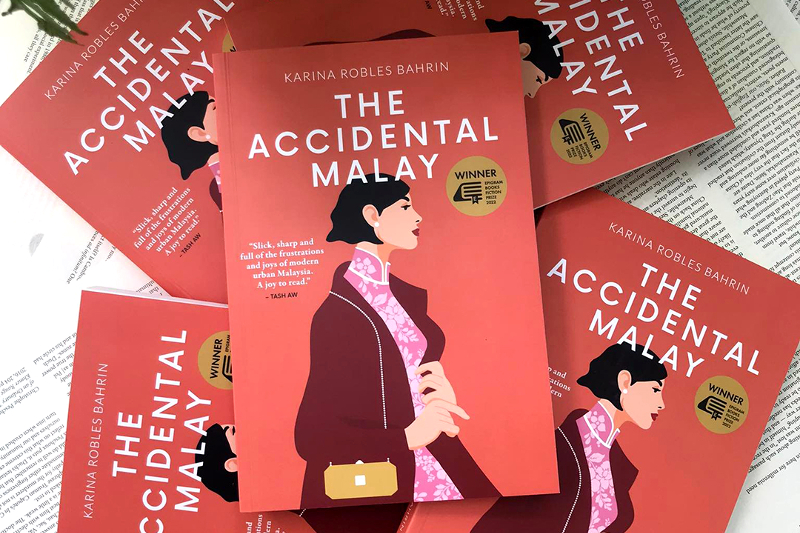
Fiction is grounded in fact in The Accidental Malay, set mainly in Kay-Yell of 2010 and Ipoh (Photo: Epigram Books)
People, place and politics tack down The Accidental Malay, Karina Robles Bahrin’s debut novel about a 41-year-old eyeing control of her family’s billion-ringgit bak kwa company, who is dealt a curveball when she discovers her real identity.
There is punch too, starting with the opening lines: “So much for torrid sex tonight. At least, the bartender is used to her waiting, sometimes for a little while, but other times till closing.”
This image of Jasmine Leong downing tequila alone because Iskandar has stood her up again — his wife has a cold — sets the tone of this story of humans tugged in conflicting directions by race, class, gender and religion, of personal desire stifled by the dictates of law and society, of corporate manoeuvres and hush-hush alliances with powerful politicians who can get you contracts.
There is also the weight of gender and family expectations. Poh Poh, the formidable grandmother who raised Jasmine after her father was killed in the May 13 riots, often tells her, “You are a girl, you can never do enough.” Her cousin Kevin, whom first aunt Ruth thinks should become CEO of Phoenix Public Ltd after the matriarch dies, then settle down, only has eyes for beautiful Matthias, a deft cook of Chinese dishes.
Iskandar says there is no walking away from family when she wants more of him. He can only marry a Muslim; Poh Poh would never allow her to convert. More importantly, Jasmine does not want to be one. Marrying a Muslim would mean “an entire lifetime of eating wiped out”. So they meet at places his people would not go, and she waits for leftover minutes from his busy life so they can crawl under the covers again.
20211107_la_paripari_0121.jpg

Sex runs through the pages, often hurried, sometimes tired, never lurid. Alone after Iskandar leaves, Jasmine counts the cost of love. She wants everything, love included, but at what price?
When Jasmine learns that she is a Malay Muslim, new whys and what-ifs intersect her already complicated relationship with Iskandar and her two watchful aunts. The past creeps into the present as she makes plans for the future. Characters with peculiar social and ethnic eccentricities crop up, reflecting how people find their place in a multi-cultural society and make the best of what life deals them.
Karina keeps a good grip on the pace of this riveting story focused on a touchy subject that gnaws at an urban nation and threatens to tear it apart. Sharp, observant and bold, she uses humour to soften the sting of what needs to be said even if people do not listen, or will not. She has a wonderful way with words that makes you re-read passages for their wit and polish, and which draw thoughts niggling at the back of your mind out into the open.
Fiction is grounded in fact in The Accidental Malay, set mainly in Kay-Yell of 2010 and Ipoh, the mining town with white hills tipped by clouds. It is where Jasmine grew up, among practical folk who willingly “swallow the bitter first, and dream of the sweet”.
There are snippets on social connections — students gathered for food and company at Malaysia Hall in London, where Jasmine, wrestling with a warren of ketupat, first meets Iskandar — and the living disconnecting with the dead. After Poh Poh, who wore minimal makeup in life but became absurd in death, was laid to rest, Auntie Ruth made sure Jasmine and Kevin rinsed their feet before entering the house, “in case there are traces of Grandmother’s spirit on their soles”.
the_accidental_malay_gerakbudaya.jpg

Karina writes with the assuredness of someone who has thought long and deep about issues that have been eating away at the country. Kuan Yew, Jasmine’s poor classmate who did well in Australia, voices anger over a system that denied him a scholarship but sent those who did poorly to the UK and the US on account of their race.
The author has clearly seen events erupt, sparked by racial tensions, and the consequences of mob frenzy, and puts them in this story. Burhanuddin Ishak — the husband of Jasmine’s mother who abandoned her after her father died — rouses young demonstrators in front of a city-centre store, brandishing placards with crossed-out illustrations of pigs. Religious groups have tried to claim Jasmine as one of their own, but failed. Deeply offended by Phoenix’s “blatant disregard and disrespect for Muslims in this country”, they want her to resign.
The Accidental Malay won the Epigram Books Fiction Prize 2022, which promotes contemporary creative writing and rewards excellence in Southeast Asian literature.
In a February interview with Options, Karina said the book is controversial and has to be written by a Malay. Her personal tie to it is that she was brought up as a Malay Muslim. But her mother is from the Philippines and her “little pushback” with her fiction is to include mum’s surname, Robles, as her middle name. It is an attempt to reclaim her Filipino side and make it part of her identity.
Purchase a copy of 'The Accidental Malay' at Litbooks for RM55.90 here.
This article first appeared on Aug 29, 2022 in The Edge Malaysia.


